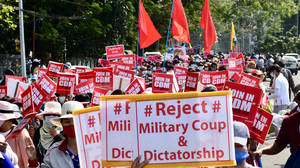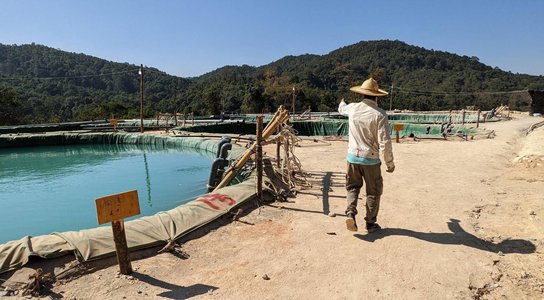February 1, 2023 marks two years since Myanmar’s military arrested the country’s civilian leadership in a coup d’etat that has plunged the country into violence after the military severely underestimated the depth of opposition to its attempts to retake power.
Instead of solidifying military control, the coup triggered nationwide protests and, following a brutal crackdown by the military, the formation of an armed resistance that has fought to return the country to democratic governance.

Protestors oppose the Myanmar military's 2021 coup. Blood Money Campaign
The United States, United Kingdom, and European Union – the pro-democracy movement’s most vocal international backers – have looked for ways to support the anti-coup resistance and punish the junta. Targeted financial sanctions have emerged as a prominent policy tool for all three, and they have collectively sanctioned 154 targets in over a dozen waves of sanctions.
Our new report – a joint briefing between Global Witness and EarthRights International – looks in depth at the US, UK, and EU sanctions regimes to assess their efficacy and provide recommendations about how to strengthen sanctions policy to best support the pro-democracy movement.
Our report assess sanctions policy against two criteria that policymakers in the US, UK, and EU have all cited as important guiding principles for their sanctions policy: coordination and impact. Have the US, UK, and EU implemented sanctions in a coordinated manner, and have they sanctioned targets that are likely to have a meaningful impact on the course of the conflict in Myanmar?
Key Findings
Our report finds evidence of lacking coordination and serious gaps in sanctioning the highest-impact targets.
- 111 (67%) of the 165 individuals and entities sanctioned by the US, UK, and/or EU have been sanctioned unilaterally. Only 22 (13%) have been sanctioned by all three.
- Coordination failures are evident in the targeting of specific, priority areas like arms dealing, where the US, UK, and EU have each targeted different parts of the same arms network, for example.
- There are significant gaps in sanctioning high-impact targets as well, with the junta’s main revenue sources, access to arms, and ability to fuel its fighter jets all largely unsanctioned.
- Emblematic of issues of both coordination and impact is the US and UK failure to join the EU in sanctioning Myanmar’s offshore gas industry – the junta’s largest foreign currency source – and the state-owned enterprise overseeing the industry, MOGE.
- The failures of coordination and refusal to sanction high-impact targets has undermined US, UK, and EU sanctions efforts and weakened their ability to effectively push diplomatic partners to take a tougher line towards the military junta.
- Download the full briefing : Missed opportunities (799.7 KB), pdf
- Download the dataset on US, EU and UK sanctions (152.2 KB), xlsx

